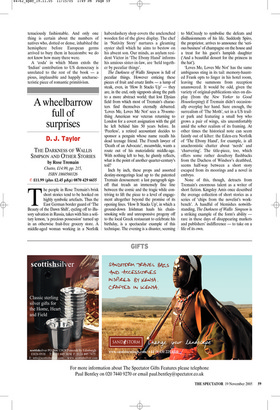A wheelbarrow full of surprises
D. J. Taylor
THE DARKNESS OF WALLIS SIMPSON AND OTHER STORIES by Rose Tremain Chatto, £14.99, pp. 215, ISBN 1860560326 ✆ £11.99 (plus £2.45 p&p) 0870 429 6655 The people in Rose Tremain’s brisk short stories tend to be hooked on highly symbolic artefacts. Thus the East German border guard of ‘The Beauty of the Dawn Shift’, cycling off to illusory salvation in Russia, takes with him a solitary lemon, ‘a precious possession’ turned up in an otherwise fruit-free grocery store. A middle-aged woman working in a Norfolk haberdashery shop covets the unclenched wooden fist of the glove display. The chef in ‘Nativity Story’ nurtures a gleaming oyster shell which he aims to bestow on his absent son. Our minds, as asylum resident Victor in ‘The Ebony Hand’ informs his anxious sister-in-law, are ‘held together by peculiar things’.
The Darkness of Wallis Simpson is full of peculiar things. However enticing these pieces of fruit and ersatz limbs — a lump of steak, even, in ‘How It Stacks Up’ — they are, in the end, only signposts along the path to a more abstract world; that lost Elysian field from which most of Tremain’s characters find themselves eternally debarred. ‘Loves Me, Loves Me Not’ sees a 70-something American war veteran returning to London for a covert assignation with the girl he left behind him 50 years before. In ‘Peerless’, a retired accountant decides to sponsor a penguin whose name recalls his dead teenage friend. The French lawyer of ‘Death of an Advocate’, meanwhile, wants a route out of his materialistic middle-age. With nothing left to buy, he glumly reflects, what is the point of another quarter-century’s toil?
Inch by inch, these props and assorted destiny-mongerings lead up to the patented Tremain denouement: a last paragraph signoff that treads an immensely fine line between the comic and the tragic while contriving to lift the piece to a level of engagement altogether beyond the promise of its opening lines. ‘How It Stacks Up’, in which a ground-down Irishman hauls his chainsmoking wife and unresponsive progeny off to the local Greek restaurant to celebrate his birthday, is a spectacular example of this technique. The evening is a disaster, seeming to McCreedy to symbolise the defeats and disillusionments of his life. Suddenly Spiro, the proprietor, arrives to announce the ‘serious business’ of champagne on the house and a treat for his guest’s lumpish daughter (‘And a beautiful dessert for the princess in the hat’).
‘Loves Me, Loves Me Not’ has the same ambiguous sting in its tail: memory-haunted Frank opts to linger in his hotel room, leaving the summons from reception unanswered. It would be odd, given the variety of original-publications sites on display (from the New Yorker to Good Housekeeping) if Tremain didn’t occasionally overplay her hand. Sure enough, the surrealism of ‘The Moth’, set in a US trailer park and featuring a small boy who grows a pair of wings, sits uncomfortably amid the sober realism of its framing. At other times the historical note can seem faintly out of kilter: the Eden-era Norfolk of ‘The Ebony Hand’, for example, is all anachronistic chatter about ‘nerds’ and ‘charvering’. The title-piece, too, which offers some rather desultory flashbacks from the Duchess of Windsor’s deathbed, seems half-way between a short story escaped from its moorings and a novel in embryo.
None of this, though, detracts from Tremain’s enormous talent as a writer of short fiction. Kingsley Amis once described the average collection of short stories as a series of ‘chips from the novelist’s workbench’. A handful of blemishes notwithstanding, The Darkness of Wallis Simpson is a striking example of the form’s ability rare in these days of disappearing markets and publishers’ indifference — to take on a life of its own.

























































 Previous page
Previous page